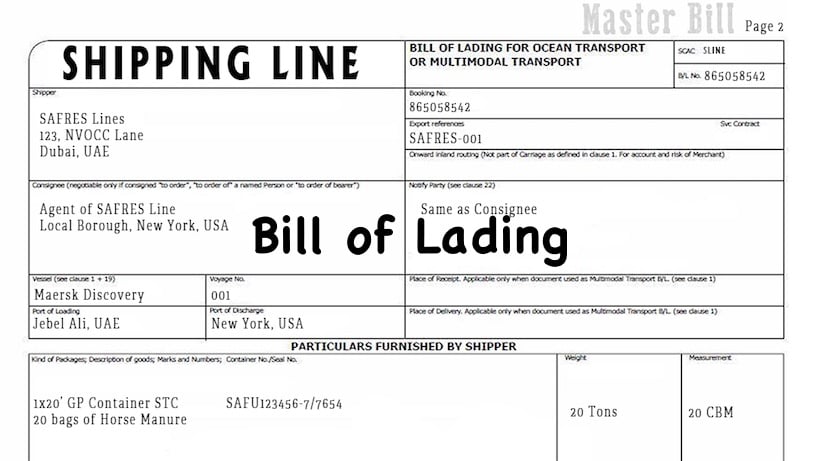Bill of Lading Meaning/Definition. A bill of lading is a document issued by a carrier to acknowledge receipt of cargo for shipment. Although the term historically related only to carriage by sea, a bill of lading may today be used for any type of carriage of goodsWikipedia.
If you like this article then please like us on Facebook so that you can get our updates in future ……….and subscribe to our mailing list ” freely “
Recommended Articles
- Supply Chain Management
- Balance of payments (BOP) and Its components
- How to Pay TDS Online Full Guide and Procedure
- TDS Rate Chart
Bill of Lading – Meaning
- In the process of shipping of goods we often heard about Bill of lading which is very important document.
- The bill of lading serves as a receipt of shipment of goods when the goods are delivered to the prefixed destination.
- A perfect Bill Of Lading legally indicates that the carrier has received the freight as per the details contained in the Bill and is obligated to deliver that freight in good condition to the person who was authorized to get them.
Importanceof Lading
1. Proof of evidence
The Bill of lading is a primary proof and that acts as an evidence of the contract of shipment of goods entered into between the person who ” provides carriage of goods service” and the “Owner of those goods” in order to carry out the transportation of the goods involved as per the contract between the buyer and the seller.
Advertisement
Content in this Article
2. Acts as Document of Title to the goods
When the actual owner of the goods sells the theme to another party while those goods are on the way to reach destination ie in the process of carriage then owner issues a document of title of goods to buyer authorising him to receive the goods.
Types of Bill of lading
1. Negotiable Bill of Lading
This type of Bill of lading can be used as a negotiable instrument for payments between a buyer and seller with the involvement of letter of credit. A negotiable bill of lading must be treated with due care like a precise document and all precautions must be taken to keep it safe.
Must Read –Form 3CA 3CB 3CD In Word Excel and Java Format
2. Straight Bill of Lading
This kind of Bill of lading can not act as a document of title to goods because it is a non negotiable instrument. Here ,in the Bill itself they write the name of the consignee or recipient of goods So this is not negotiable. And goods are surrendered to those whose name is noted there on.
3. Seaway Bill of Lading
This is also not negotiable like the previous one. but mostly used for
- Intra company shipments between the branches of a same entity located in different locations.
- And where the shipment of cargo takes place between two different companies but there are no negotiations required between the two either directly or indirectly.
Must Read –PAN Card Status
Recommended Articles
- What is Nidhi Company and points to be considered
- What is Deemed Public Company
- Dormant Company
- Loans by the Directors to Company
- Registration of Section 8 Company
- One Person Company
- Post Incorporation Compliances of Private Limited Company
- Overview of Core Investment Company

